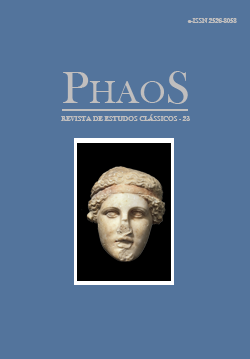Abstract
This text discusses some topics of Euripides’ Heracles in parallel with Pindar’s Olympian 12, considering that the latter has remarkable points of contact with the plot and some themes of this tragedy. The main objective of the discussion is to show a striking feature of the Heracles, the use of poetic forms and themes typical of other lyrical genres, especially of the epinician, little productive at the time of composition of this tragedy, but which had in Heracles one of its most recurrent pan-Hellenic heroes.
References
BARRETT, W. S. Pindar’s twelfth Olympian and the fall of the Deinomenidai. Journal of Hellenic Studies v. 93, p. 23-35, 1973.
BOND, G. Euripides: Heracles. Clarendon: Oxford, 1981.
BRANDÃO, J. L. A (des)construção do herói (o problema da mediação no Héracles de Eurípides). Ensaios de literatura e filologia, v. 5, p. 113-75, 1987. Disponível em: https://periodicos.ufmg.br/index.php/literatura_filologia/issue/view/420. Acesso em: 1 ag. 2023.
BREMER, J. M. Euripides Heracles 581. Classical Quarterly, v. 22, p. 236-40, 1972.
CAREY, C. The victory ode in the theatre. In: AGÓCS, P.; CAREY, C.; RAWLES, R. (orgs.) Receiving the komos: ancient and modern receptions of the victory ode. London: Institut of Classical Studies, 2012, p. 17-36.
CURRIE, B. Pindar and the cult of heroes. Oxford: Oxford University Press, 2005.
DIGGLE, J. Euripidea. Oxford: Oxford University Press, 1994.
DHUGA, U. S. Choral identity and the chorus of elders in Greek tragedy. Lanham: Rowman & Littlefield, 2011.
EGLI, F. Euripides im Kontext: Zeitgenössischer intellektueller Strömungen. Analyse der Funktion philosophischer Themen in the Tragödien und Fragmenten. München/Leipzig: Saur, 2003.
ERBSE, H. Studium zum Prolog des euripideischen Tragödie. Berlin: de Gruyter, 1984.
FINGLASS, P. J. Sophocles: Ajax. Cambridge: Cambridge University Press, 2011.
FORD, A. Linus: the rise and fall of lyric genres. In: FOSTER, M.; KURKE, L.; WEISS, N. Genre in archaic and classical Greek poetry: theories and models. Leiden: Brill, 2019, p. 57-81.
FRADE, G. A Olímpica 12 de Píndaro: tradução e comentário. Nuntius antiquus, v. 8, n. 1, p. 129-42, 2012. Disponível em: https://periodicos.ufmg.br/index.php/nuntius_antiquus/article/view/17221. Acesso em: 1 ag. 2023.
FRANCISCATO, C. R. Eurípides: Héracles. São Paulo: Palas Athena, 2003.
GENTILI, B. et al. Pindaro: Le Olimpiche. Milano: Lorenzo Valla, 2013.
GERBER, D. E. Euterpe. Amsterdam: Hakkert, 1970.
GRETHLEIN, J. Asyl und Athen: die Konstruktion kollektiver Identität in der griechischen Tragödie. Stuttgart/Weimar: Metzler, 2003.
HENRICHS, A. Dancing in Athens, dancing on Delos: some patterns of choral projection in Euripides. Philologus v. 140, p. 48-62, 1996.
HUNTER, R. Critical moments in classical literature: studies in the ancient view of literature and its uses. Cambridge: Cambridge University Press, 2009.
KROEKER, E. Der Herakles des Euripides: Analyse des Dramas. Giessen: Tese de doutorado, 1938.
KURKE, L. The traffic in praise: Pindar and the poetics of social economy. Ithaca: Cornell University Press, 1991.
MASTRONARDE, D. J. Euripides: Phoenissae. Edited with introduction and commentary. Cambridge: Cambridge University Press, 1994.
NICHOLSON, N. J. The poetics of victory in the Greek West: epinician, oral tradition, and the Deinomenid empire. New York: Oxford University Press, 2015.
NISETICH, F. J. The leaves of triumph and mortality: transformation of a traditional image in Pindar’s Olympian 12. Transactions of the American Philological Association, v. 107, p. 235-64, 1977.
PAPADOPOULOU, T. Heracles and Euripidean tragedy. Cambridge: Cambridge University Press, 2005.
PARRY, H. The second stasimon of Euripides Heracles (637-700). American Journal of Philology, v. 86, p. 363-74, 1965.
PORTER, J. I. The sublime in antiquity. Cambridge: Cambridge University Press, 2016.
PUCCI, P. Euripides’ revolution under cover: an essay. Cornell: Cornell University Press, 2016.
RACE, W. H. Elements of plot and the formal presentation in Pindar’s Olympian 12. Classical Journal, v. 99, p. 373-94, 2004.
SILK, M. Pindar’s poetry as poetry: a literary commentary on Olympian 12. In: HORNBLOWER, S.; MORGAN, C. (orgs.) Pindar’s poetry, patrons, and festivals: from archaic Greece to the Roman empire. Oxford: Oxford University Press, 2007, p. 177-98.
STROHM, H. Tyche. Stuttgart: J. G. Cottasche, 1944.
SWIFT, L. The hidden chorus: echoes of genre in tragic lyric. Oxford: Oxford University Press, 2010.
TELÒ, M. Archive feelings: a theory of Greek tragedy. Columbus: The Ohio State University Press, 2020. Disponível em: file:///C:/Users/crtwe/Downloads/Telo_11-3_9780814280812_OA%20(1).pdf. Acesso em: 1 ag. 2023.
THEUNISSEN, M. Pindar: Menschenlos und Wende der Zeit. München: Beck, 2000.
THUMMER, E. Die Religiosität Pindars. Innsbruck: Universitätsverlag Wagner, 1957.
TORRANO, J. Eurípides: teatro completo. Vol. 2. São Paulo: Iluminuras, 2016.
VERDENIUS, W. J. Commentaries on Pindar. Volume I. Leiden: Brill, 1987.
WEISS, N. Generic hybridity in Athenian tragedy. In: FOSTER, M.; KURKE, L.; WEISS, N. (org.) Genre in archaic and classical Greek poetry: theories and models. Leiden: Brill, 2019.
WERNER, C. Andrómaca de Eurípides: El prólogo y la noción de unidad en la Poética de Aristóteles. Synthesis, v. 22, p. 1-19, 2015. Disponível em: http://www.scielo.org.ar/pdf/synth/v22/v22a05.pdf. Acesso em: 1 ag. 2023.
WERNER, C. Memórias da Guerra de Troia: a performance do passado épico na Odisseia de Homero. Coimbra: Imprensa da Universidade de Coimbra, 2018.
WERNER, C. Caracterização e discurso na tragédia grega: o ancião e a esposa no prólogo do Héracles de Eurípides. Códex, v. 8, n. 1, p. 224-41, 2020. Disponível em: https://revistas.ufrj.br/index.php/CODEX/article/view/33631. Acesso em: 1 ag. 2023.
WILAMOWITZ-MOELLENDORFF, U. Euripides Herakles. Vol. 3. 2ª ed. Berlin: Akademie, 1959.
WILAMOWITZ-MOELLENDORFF, U. Pindaros. Berlin: Weidmann, 1966.
WILSON, P. Euripides’ tragic Muse. In: CROPP, M. et al. (org.) Euripides and tragic theatre in the late fifth century. Illinois Classical Studies, v. 24-25. Champaign: Stipes, 1999-2000, p. 427-50.

This work is licensed under a Creative Commons Attribution-NonCommercial-ShareAlike 4.0 International License.
Copyright (c) 2023 Creative Commons


